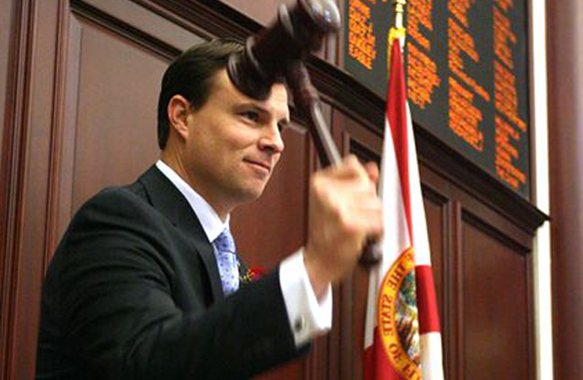House Speaker Will Weatherford, R-Wesley Chapel | Scott Keeler | Times
This voucher program has relied on a convoluted redirect of tax dollars to avoid running afoul of the state Constitution that prevents public dollars from flowing to religious institutions.
A Times Editorial | Originally Published at The Tampa Bay Times. Tuesday, April 8, 2014 5:10pm
Florida public school students this month are in the throes of the FCAT, the controversial high-stakes test that helps determine everything from teacher raises to school funding. But private schools that take the state’s voucher money to teach low-income students don’t face the same scrutiny, even as some lawmakers want to give them even more public money. That doubles down on a hypocritical education policy that ignores the Legislature’s duty to fund a uniform and free public school system. The Senate, which has shown little interest in expanding vouchers this session, should stand firm and let this bad idea die.
The bill before the House today, HB 7167, is a grab bag of changes to the Corporate Income Tax Scholarship program, which now relies on more than redirected corporate income tax dollars to fund private tuition vouchers for low-income children. With the support of House Speaker Will Weatherford, R-Wesley Chapel, the nonprofit that administers the vast majority of vouchers — and pockets millions in administration fees from money that should be going to the state — wants to accelerate the annual increases in the state’s enrollment cap on the program, raise the value of each voucher, expand the pool of low-income families who can qualify for the program and set tougher standards for nonprofits to qualify to distribute vouchers. Step Up for Students, which now serves roughly 60,000 students, has claimed there is demand to serve another 34,000 more — though it doesn’t keep a wait list to prove it.
The Senate wisely tabled its bill weeks ago, and noticeably missing from the House bill is the one thing Senate President Don Gaetz, R-Niceville, had suggested would be his priority: better assessment of voucher recipients’ learning. The current process for such accountability pales in comparison to the machinations public schools undergo. Private schools are merely required to send voucher students’ results on a nationally norm-referenced test to a single academic to analyze. Nor are voucher schools required to meet the same curriculum standards as public schools. Private schools don’t need to offer a breadth of courses and can forgo teaching some subjects, such as evolution, for example, even though evolution is a part of the state’s academic standards.
For years, voucher supporters have claimed they are just trying to serve low-income students who frequently have more challenges to overcome and are too often zoned for the worst public schools. But the data is far from clear that voucher students actually perform any better in these private settings. And their departure from public schools means overhead costs must be split among fewer students, ultimately leaving less money for the classroom.
This voucher program has always been too clever by half, relying on a convoluted redirect of tax dollars to avoid running afoul of the state Constitution, which prevents public dollars from flowing to religious institutions. And even this year the voucher expansion isn’t standing on its own. House sponsors have cynically included it in the same bill with other proposals related to serving severely disabled students, who are a priority for Sen. Andy Gardiner, R-Orlando, in line to be the next Senate president.
Florida students don’t need more vouchers. They need a Legislature less interested in gimmicks and more committed to spending the money to do the job right in the public schools, where the state has set clear academic expectations. The Senate needs to stand firm.
Editorial: Florida doesn’t need more vouchers 04/08/14












Leave A Comment